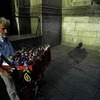Lebanon question challenges Germany
The memory of the Holocaust is fuelling a debate in Germany over involvement in a Lebanon peace force, even before practical steps are taken to create one. German newspapers on Wednesday aired a number of arguments for and against sending German soldiers to the Middle East, with the "burden of history" looming large. "History is the past, but the history of the Holocaust belongs to the German present," said the Frankfurter Rundschau. No German soldier should, even theoretically, "be brought into a situation where he has to aim his weapon at an Israeli", it added. The Suddeutsche Zeitung said it was "astonishing" that politicians were discussing the idea, while Austria's Der Standard said it was "unthinkable" that the grandchildren of Holocaust perpetrators might find themselves shooting at the grandchildren of victims. Responsibility The secretary general of the Central Council of Jews in Germany, Stephan Kramer, added his voice to those against German deployment. "There are Holocaust survivors living in Israel. I don't think they would feel good about German soldiers in South Lebanon, and certainly not if they had to take a stand against an Israeli soldier," he said. He added that he would still be opposed if the Israeli government agreed. It is 12 years since Germany's post-war constitution was changed to allow the use of armed force in international disputes. In that time they have taken part in peacekeeping operations in the Balkans, Afghanistan, Ethiopia, Sudan and DR Congo. But the prospect of peace enforcement in Lebanon raises new complications. For Foreign Minister Frank-Walter Steinmeier, history actually burdens Germany with a responsibility not to walk away, but to get involved. "I think this is appropriate given the difficult shared history between Germany and Israel," he told German broadcaster ZDF on Sunday. 'Never again' His Social Democratic Party, like Chancellor Angela Merkel's Christian Democratic Union, is divided on the issue, while the three main opposition parties - the Greens, the Liberal FPD and the hard-left PDS - are against. A leading Christian Democrat in the European Parliament, Elmar Brok, is among those arguing that German involvement must be ruled out, on the grounds that Germans may be unable to put into effect the "robust mandate" he says the Lebanon force will need. "It is impossible for a German soldier to use force against an Israeli soldier," says Mr Brok, head of the parliament's Foreign Affairs committee. The opinion editor of Berlin's Der Tagesspiegel newspaper, Malte Lehming, agrees that this scenario would violate the main lesson of the last century: "Never again." "I think Germany should take part in a multinational force enforcing peace in south Lebanon, but let's secure the Lebanon/Syria border where things like that are less likely to happen," he says. "I think we can take that risk." Casualties Joerg Himmelreich of the German Marshall Fund argues that the nightmare scenario is not, in fact, at all likely. German troops would be much more likely to clash with Hezbollah than with Israeli forces, he says. But he warns that German participation in Lebanon would be a new step for Germany in a different way, as it would be the first time German troops had taken part in a mission with a high probability of casualties. How long will it be before Germany can contemplate the possibility of German peace-enforcers confronting Israeli troops? "Maybe 10 years, 15 years..." says Malte Lehming. "The World Cup has shown how relaxed people feel about pride and their nation, without producing any kind of nationalist feelings," says Elmar Brok. "But we remember the past and we will not forget our responsibility." Stephan Kramer thinks German soldiers will never be able to approach the borders of Israel. "Even if it's the great-great-grandchildren, I cannot imagine it," he says. "Around the world, almost everywhere, but not when there is a chance of confrontation with an Israeli soldier."





